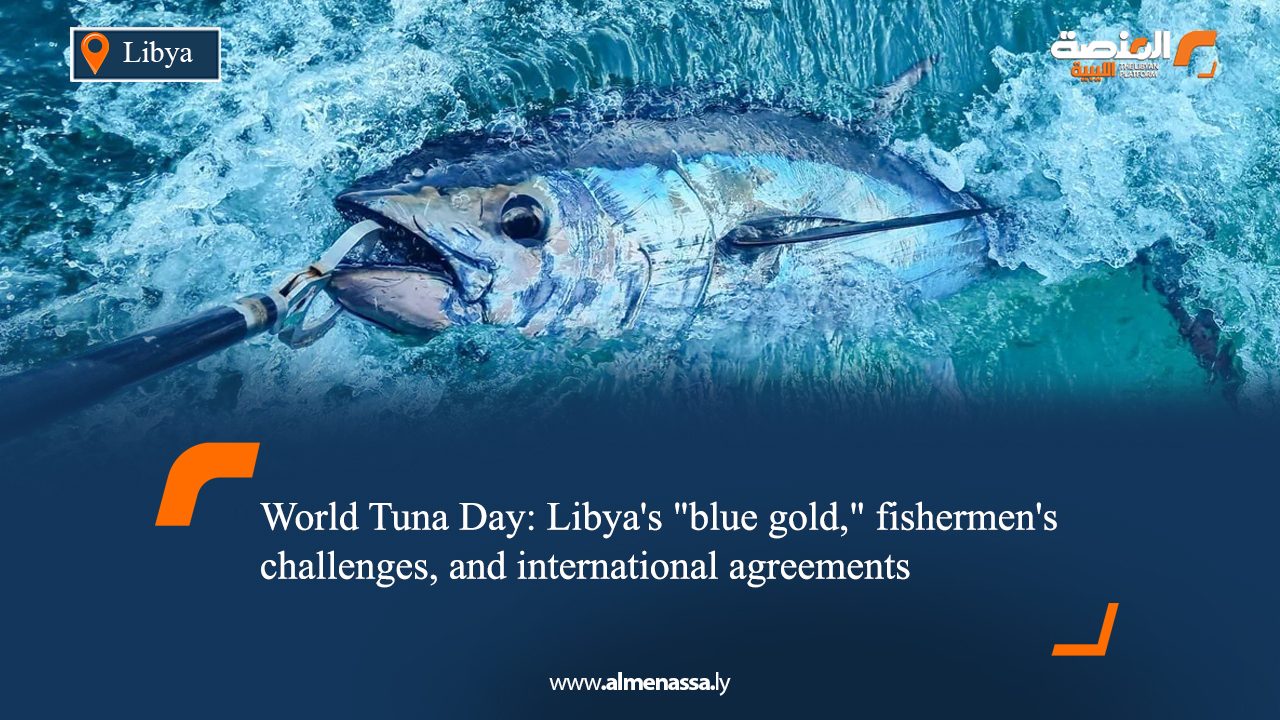May 2nd marks World Tuna Day, an annual event established to raise awareness about the significance of this globally popular fish. More than just a delicious and quick meal, tuna holds substantial environmental, economic, and health importance.
Officially recognized by the United Nations General Assembly in 2016, the concept for World Tuna Day originated at a 2011 meeting of the Western and Central Pacific Fisheries Commission. The core objective is to highlight the dangers of overfishing and advocate for sustainable practices to ensure the continued presence of tuna in our oceans.
Libya is currently experiencing the peak of its “blue gold” fishing season. This refers to bluefin tuna, a crucial economic resource for the nation, particularly as the Libyan coast is home to this highly valued species.
The bluefin tuna’s distinctive fin has earned it the moniker “blue gold.” Fishing for this species along the Libyan coast dates back to 1919, with fishermen actively pursuing their catch from mid-April to mid-July.
The Libyan Marine Science Society notes that flocks of bluefin tuna migrate along the coastline stretching from the Bouri oil field in the west, originating from the open ocean, to Ras al-Teen in the east, making them readily available for fishing in Libyan waters.
Revenue Loss
Despite the immense economic value of this marine wealth, it faces significant neglect, leading to substantial revenue losses. According to BNN Breaking, quoting tuna fishing expert and Libyan Marine Society member Salem Mohammed Al-Masoud, Libya loses an estimated $5 billion annually due to illegal fishing in its territorial waters. He pointed out that Libya’s annual tuna catch is approximately 902 tons, exceeding domestic market demand.
The Ministry of Marine Resources reported Libya’s 2022 tuna catch quota as 2,253 tons but did not disclose the 2023 figure. While some neighboring countries saw increased quotas, the Libyan market experienced a significant drop in tuna prices, reaching as low as 20 Libyan dinars per kilogram, due to an abundance of supply. The season opened with the sale of a 300-kilogram tuna, and a 450-kilogram fish was caught during the season.
Official estimates confirm that Libya possesses a potential exploitable fish stock exceeding 100,000 tons of various species. However, this resource remains largely untapped due to a lack of modern fishing equipment and the necessary handling, processing, and marketing infrastructure.
Current primary tuna fishing methods in Libya are limited to longline fishing, purse seining, and fixed traps (tonnara).
Greater economic benefit could be derived from Libya’s tuna resources through the establishment of dedicated fish processing plants and the implementation of a well-structured marketing plan.
Tuna Types and Benefits
Libyan territorial waters are rich in diverse tuna species, with the most prominent being bluefin tuna, yellowfin tuna, skipjack tuna, bigeye tuna, and albacore tuna. These varieties constitute 75% of global tuna meat production in international markets.
Abdullah Al-Maqawashi, an expert at the Libyan Network for Monitoring Marine Biodiversity, highlights the significant nutritional value of tuna. One kilogram of bluefin tuna contains 144 calories, 4.90 grams of polyunsaturated fats, 1.25 grams of saturated fats, and 38 milligrams of cholesterol.
Tuna also offers various health benefits, including potential cancer resistance due to its unique selenium compound called selenoneine, a potent antioxidant that protects red blood cells from damage. It is also beneficial for heart health as a good source of omega-3 fatty acids, healthy unsaturated fats that improve blood vessel function and protect against heart disease. Furthermore, tuna can aid in short-term weight loss due to its low carbohydrate and high protein content. A recent University of California study also demonstrated that niacin (vitamin B3) inhibits LDL cholesterol by boosting HDL levels.
Tuna in the Local Market
The local Libyan market exhibits strong demand for tuna, considered a popular and delicious dish. It is prepared in various ways, including sandwiches with harissa, baked, fried, as “kamounia,” “tabikha,” “haraymi,” tagine, with pasta, couscous, and numerous other Libyan culinary specialties.
Despite the value and importance of tuna, and its significant economic potential as a revenue source for Libya, the lack of adequate resources remains a major obstacle to the optimal utilization of this valuable marine wealth.


